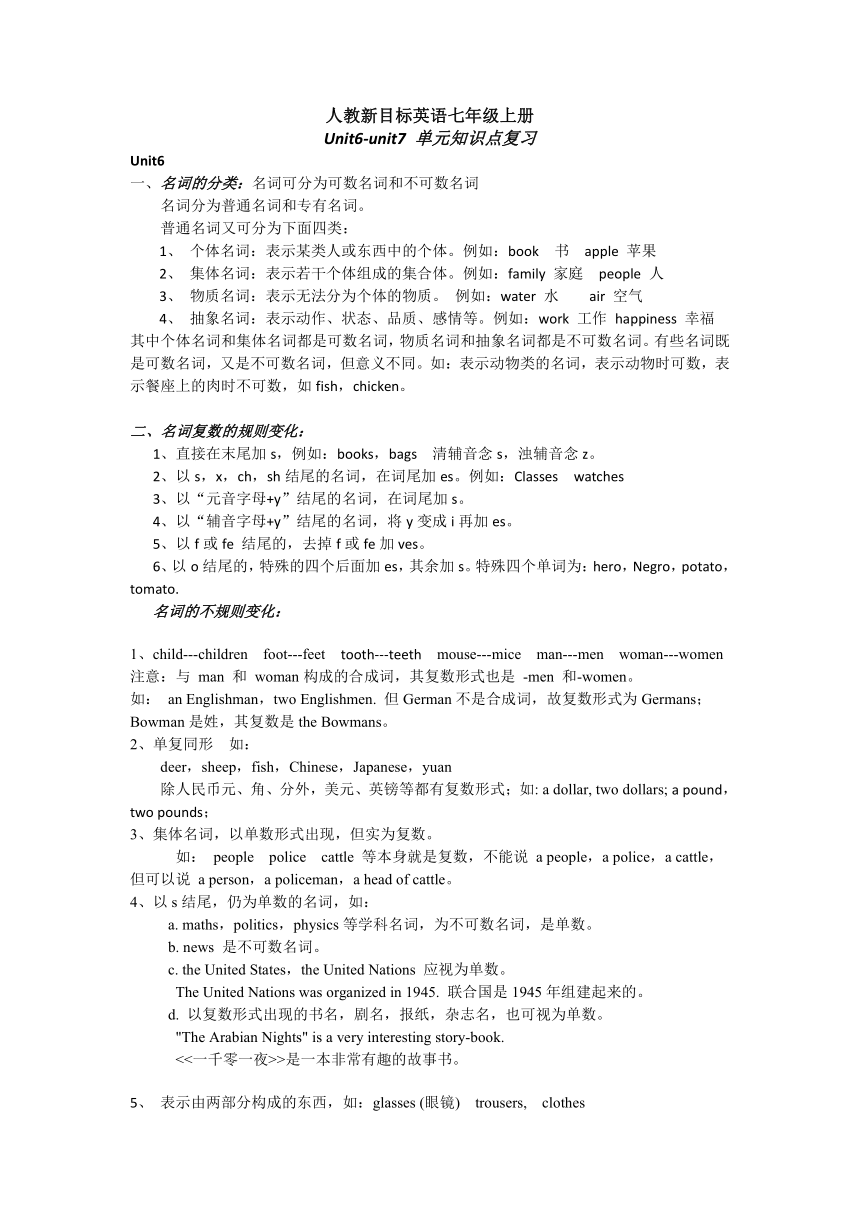人教新目标英语七年级上册unit6-7单元知识点复习
文档属性
| 名称 | 人教新目标英语七年级上册unit6-7单元知识点复习 |

|
|
| 格式 | zip | ||
| 文件大小 | 17.8KB | ||
| 资源类型 | 教案 | ||
| 版本资源 | 人教新目标(Go for it)版 | ||
| 科目 | 英语 | ||
| 更新时间 | 2020-08-25 23:02:35 | ||
图片预览

文档简介
人教新目标英语七年级上册
Unit6-unit7
单元知识点复习
Unit6
名词的分类:名词可分为可数名词和不可数名词
名词分为普通名词和专有名词。
普通名词又可分为下面四类:
个体名词:表示某类人或东西中的个体。例如:book
书
apple
苹果
集体名词:表示若干个体组成的集合体。例如:family
家庭
people
人
物质名词:表示无法分为个体的物质。
例如:water
水
air
空气
抽象名词:表示动作、状态、品质、感情等。例如:work
工作
happiness
幸福
其中个体名词和集体名词都是可数名词,物质名词和抽象名词都是不可数名词。有些名词既是可数名词,又是不可数名词,但意义不同。如:表示动物类的名词,表示动物时可数,表示餐座上的肉时不可数,如fish,chicken。
二、名词复数的规则变化:
1、直接在末尾加s,例如:books,bags
清辅音念s,浊辅音念z。
2、以s,x,ch,sh结尾的名词,在词尾加es。例如:Classes
watches
3、以“元音字母+y”结尾的名词,在词尾加s。
4、以“辅音字母+y”结尾的名词,将y变成i再加es。
5、以f或fe
结尾的,去掉f或fe加ves。
6、以o结尾的,特殊的四个后面加es,其余加s。特殊四个单词为:hero,Negro,potato,tomato.
名词的不规则变化:
1、child---children foot---feet tooth---teeth
mouse---mice man---men
woman---women
注意:与
man
和
woman构成的合成词,其复数形式也是
-men
和-women。
如:
an
Englishman,two
Englishmen.
但German不是合成词,故复数形式为Germans;
Bowman是姓,其复数是the
Bowmans。
2、单复同形 如:
deer,sheep,fish,Chinese,Japanese,yuan
除人民币元、角、分外,美元、英镑等都有复数形式;如:
a
dollar,
two
dollars;
a
pound,two
pounds;
3、集体名词,以单数形式出现,但实为复数。
如:
people police cattle
等本身就是复数,不能说
a
people,a
police,a
cattle,但可以说
a
person,a
policeman,a
head
of
cattle。
4、以s结尾,仍为单数的名词,如:
a.
maths,politics,physics等学科名词,为不可数名词,是单数。
b.
news
是不可数名词。
c.
the
United
States,the
United
Nations
应视为单数。
The
United
Nations
was
organized
in
1945.
联合国是1945年组建起来的。
d.
以复数形式出现的书名,剧名,报纸,杂志名,也可视为单数。
"The
Arabian
Nights"
is
a
very
interesting
story-book.
<<一千零一夜>>是一本非常有趣的故事书。
5、
表示由两部分构成的东西,如:glasses
(眼镜) trousers, clothes
若表达具体数目,要借助数量词
pair(对,双); suit(套)?
a
pair
of
glasses;
two
pairs
of
trousers
Unit7
基数词的构成:详见另一份资料
Unit6-unit7主要词组:
next
week下周
think
about考虑
Sounds
good.听上去不错
ask
about
询问
eating
habits
饮食习惯
want
to
do
想要做某事
have(like)+食品+for+某餐(breakfast/lunch/supper):某餐喜欢吃……
healthy
food:健康食物
how
much多少
look
nice
看上去漂亮
one
pair一双
big
sale
大甩卖
at
a
good
price
以一个合理的价格
in+颜色
a
pair
of
一双……
what
do
you
think
of…?你认为…怎么样?
ask…about…询问…有关(的事)
ask
sb
to
do
sth
请求/要求某人做
某事
need
doing
sth
=
need
to
be
done
unit6-unit7主要句式:
Do
you
like…?
Yes,I
do./No,I
don’t.
Does
she
like…?Yes,she
does./No,she
doesn’t.
How/What
about…?
Let’s
have
strawberries
and
apples.
What
do
you
like
for
breakfast?
I
really
like
it.
How
much
are
they?
They
are…
Can
I
help
you?
Yes,please.
/No,thanks.
help
help
sb
(to)
do
sth;帮助某人做某事
help
sb
with
sth帮助某人做某事
How
about
this
one?
It
looks
nice.
Thank
you.
You’re
welcome.
I’ll
take
it/them.
Here
you
are.
Unit6-unit7语言点
think
about与think
of
区别:
联系:两者都可以表示“考虑”,“对……有某种看法”,They
are
thinking
of(about)buying
a
new
car.他们正在考虑买一辆新车。
区别:think
of表示以下意思时,不和think
about换用。
想要,打算。例如:Mary,are
you
thinking
of
marrying
Tom?
Mary,你打算和Tom结婚吗?
想出;想到。例如:Who
thought
of
the
idea?
关心;想着。例如:Lei
Feng
was
always
thinking
of
others.
想起;记得。例如:I
can’t
think
of
his
name.
Think
about意为“回想过去的事情”、“考虑某计划是否切实可行”时,一般不和think
of
换用。I
often
thought
about
what
you
said.我常常想到你说过的话。
I’ll
think
about
your
suggestion,and
give
you
an
answer
tomorrow.我要考虑一下你的建议,明天给你答复。
let
sb
do
sth,让某人做某事。Let是使役动词,此外,make,have也是使役动词。
come
and
buy…为祈使句。祈使句是表示请求,命令,叮嘱等意思,动词原形开头。例如:Open
the
door,please./
Be
careful./
Come
in,everybody.
其中come的用法为:come
to
do
sth=come
and
do
sth
其中Buy
后接双宾语:buy
sb
sth或buy
sth
for
sb
给某人买某物
e.g.
Her
sister
buys
him
some
fruits=
Her
sister
buys
some
fruits
for
him.
4.
at
a
sale=on
sale减价出售
你可以在大减价时买这件毛衣。You
can
get
this
sweater
at
a
great
sale.
5.
one指泛指,代替前面提到过的同一类事或物;it则是特指,代替刚提到过的一件事或物。
Unit6-unit7
单元知识点复习
Unit6
名词的分类:名词可分为可数名词和不可数名词
名词分为普通名词和专有名词。
普通名词又可分为下面四类:
个体名词:表示某类人或东西中的个体。例如:book
书
apple
苹果
集体名词:表示若干个体组成的集合体。例如:family
家庭
people
人
物质名词:表示无法分为个体的物质。
例如:water
水
air
空气
抽象名词:表示动作、状态、品质、感情等。例如:work
工作
happiness
幸福
其中个体名词和集体名词都是可数名词,物质名词和抽象名词都是不可数名词。有些名词既是可数名词,又是不可数名词,但意义不同。如:表示动物类的名词,表示动物时可数,表示餐座上的肉时不可数,如fish,chicken。
二、名词复数的规则变化:
1、直接在末尾加s,例如:books,bags
清辅音念s,浊辅音念z。
2、以s,x,ch,sh结尾的名词,在词尾加es。例如:Classes
watches
3、以“元音字母+y”结尾的名词,在词尾加s。
4、以“辅音字母+y”结尾的名词,将y变成i再加es。
5、以f或fe
结尾的,去掉f或fe加ves。
6、以o结尾的,特殊的四个后面加es,其余加s。特殊四个单词为:hero,Negro,potato,tomato.
名词的不规则变化:
1、child---children foot---feet tooth---teeth
mouse---mice man---men
woman---women
注意:与
man
和
woman构成的合成词,其复数形式也是
-men
和-women。
如:
an
Englishman,two
Englishmen.
但German不是合成词,故复数形式为Germans;
Bowman是姓,其复数是the
Bowmans。
2、单复同形 如:
deer,sheep,fish,Chinese,Japanese,yuan
除人民币元、角、分外,美元、英镑等都有复数形式;如:
a
dollar,
two
dollars;
a
pound,two
pounds;
3、集体名词,以单数形式出现,但实为复数。
如:
people police cattle
等本身就是复数,不能说
a
people,a
police,a
cattle,但可以说
a
person,a
policeman,a
head
of
cattle。
4、以s结尾,仍为单数的名词,如:
a.
maths,politics,physics等学科名词,为不可数名词,是单数。
b.
news
是不可数名词。
c.
the
United
States,the
United
Nations
应视为单数。
The
United
Nations
was
organized
in
1945.
联合国是1945年组建起来的。
d.
以复数形式出现的书名,剧名,报纸,杂志名,也可视为单数。
"The
Arabian
Nights"
is
a
very
interesting
story-book.
<<一千零一夜>>是一本非常有趣的故事书。
5、
表示由两部分构成的东西,如:glasses
(眼镜) trousers, clothes
若表达具体数目,要借助数量词
pair(对,双); suit(套)?
a
pair
of
glasses;
two
pairs
of
trousers
Unit7
基数词的构成:详见另一份资料
Unit6-unit7主要词组:
next
week下周
think
about考虑
Sounds
good.听上去不错
ask
about
询问
eating
habits
饮食习惯
want
to
do
想要做某事
have(like)+食品+for+某餐(breakfast/lunch/supper):某餐喜欢吃……
healthy
food:健康食物
how
much多少
look
nice
看上去漂亮
one
pair一双
big
sale
大甩卖
at
a
good
price
以一个合理的价格
in+颜色
a
pair
of
一双……
what
do
you
think
of…?你认为…怎么样?
ask…about…询问…有关(的事)
ask
sb
to
do
sth
请求/要求某人做
某事
need
doing
sth
=
need
to
be
done
unit6-unit7主要句式:
Do
you
like…?
Yes,I
do./No,I
don’t.
Does
she
like…?Yes,she
does./No,she
doesn’t.
How/What
about…?
Let’s
have
strawberries
and
apples.
What
do
you
like
for
breakfast?
I
really
like
it.
How
much
are
they?
They
are…
Can
I
help
you?
Yes,please.
/No,thanks.
help
help
sb
(to)
do
sth;帮助某人做某事
help
sb
with
sth帮助某人做某事
How
about
this
one?
It
looks
nice.
Thank
you.
You’re
welcome.
I’ll
take
it/them.
Here
you
are.
Unit6-unit7语言点
think
about与think
of
区别:
联系:两者都可以表示“考虑”,“对……有某种看法”,They
are
thinking
of(about)buying
a
new
car.他们正在考虑买一辆新车。
区别:think
of表示以下意思时,不和think
about换用。
想要,打算。例如:Mary,are
you
thinking
of
marrying
Tom?
Mary,你打算和Tom结婚吗?
想出;想到。例如:Who
thought
of
the
idea?
关心;想着。例如:Lei
Feng
was
always
thinking
of
others.
想起;记得。例如:I
can’t
think
of
his
name.
Think
about意为“回想过去的事情”、“考虑某计划是否切实可行”时,一般不和think
of
换用。I
often
thought
about
what
you
said.我常常想到你说过的话。
I’ll
think
about
your
suggestion,and
give
you
an
answer
tomorrow.我要考虑一下你的建议,明天给你答复。
let
sb
do
sth,让某人做某事。Let是使役动词,此外,make,have也是使役动词。
come
and
buy…为祈使句。祈使句是表示请求,命令,叮嘱等意思,动词原形开头。例如:Open
the
door,please./
Be
careful./
Come
in,everybody.
其中come的用法为:come
to
do
sth=come
and
do
sth
其中Buy
后接双宾语:buy
sb
sth或buy
sth
for
sb
给某人买某物
e.g.
Her
sister
buys
him
some
fruits=
Her
sister
buys
some
fruits
for
him.
4.
at
a
sale=on
sale减价出售
你可以在大减价时买这件毛衣。You
can
get
this
sweater
at
a
great
sale.
5.
one指泛指,代替前面提到过的同一类事或物;it则是特指,代替刚提到过的一件事或物。
同课章节目录
- starters 预备篇(2012秋审查)
- Unit 1 Good morning !
- Unit 2 What’s this in English?
- Unit 3 What color is it ?
- Unit 1 My name's Gina.
- Section A
- Section B
- Unit 2 This is my sister.
- Section A
- Section B
- Unit 3 Is this your pencil?
- Section A
- Section B
- Unit 4 Where's my schoolbag?
- Section A
- Section B
- Unit 5 Do you have a soccer ball?
- Section A
- Section B
- Unit 6 Do you like bananas?
- Section A
- Section B
- Unit 7 How much are these socks?
- Section A
- Section B
- Unit 8 When is your birthday?
- Section A
- Section B
- Unit 9 My favorite subject is science.
- Section A
- Section B
